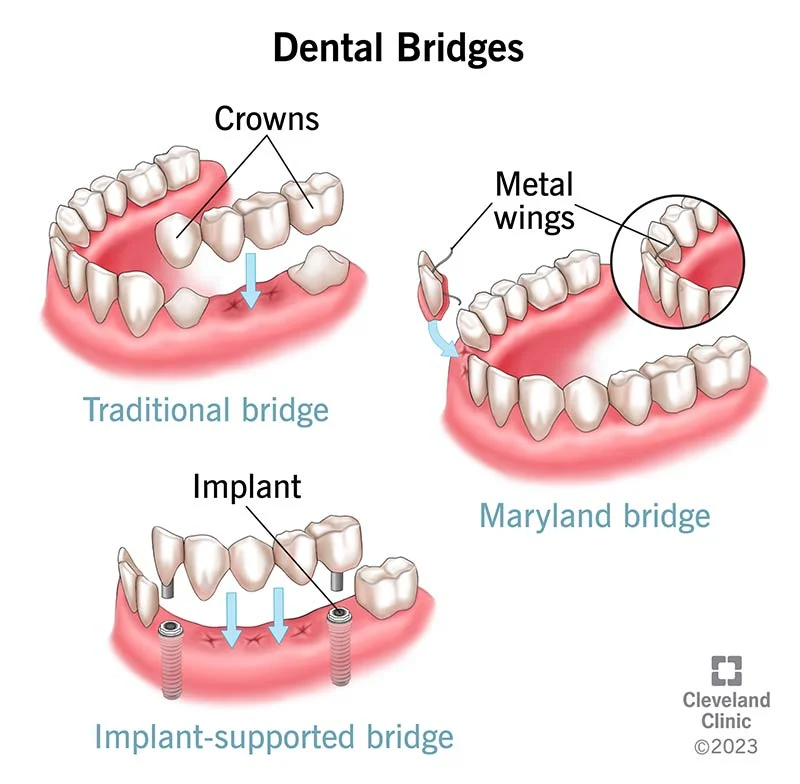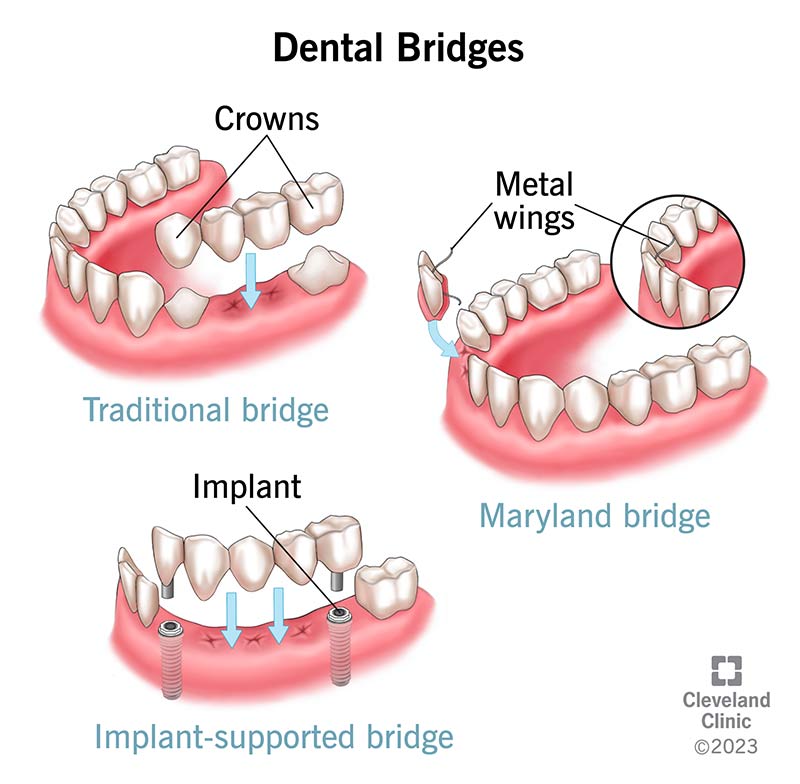
Dental bridges are robust and designed to withstand daily chewing and speaking pressures. They are typically crafted from durable materials like porcelain, ceramic, or metal alloys. These materials are carefully constructed to ensure their ability to endure normal use. Dental bridges are securely anchored to adjacent teeth or dental implants, enhancing their reliability. With proper care and maintenance, dental bridges can last for many years. Regular dental hygiene practices, including brushing, flossing, and dental check-ups, help maintain their strength and functionality. Dental bridges provide both strength and stability, making them a reliable choice for replacing missing teeth. Porcelain and metal alloys are often chosen for their durability and ability to withstand the pressures of regular use. Individuals can enjoy their favorite foods with confidence, thanks to the strength of dental bridges.
How Strong Are Dental Bridges?
Dental Bridge Basics
- Dental bridges are custom-made dental prosthetics.
- They include artificial teeth (pontics) held in place by dental crowns.
- Crowns are attached to adjacent teeth, creating a bridge to fill the gap left by missing teeth.
Strength Factors in Dental Bridges
- Materials Used: The strength of a dental bridge is significantly influenced by the materials employed. Common options include porcelain and porcelain-fused-to-metal (PFM).
- Porcelain: Offers strength and a natural appearance.
- PFM: Combines the strength of metal with porcelain’s aesthetics.
- Design Considerations: Proper design is crucial for a bridge’s strength. It should be securely anchored to abutment teeth on either side of the gap.
- Abutment teeth provide support and distribute biting and chewing forces.
- Stability and longevity depend on the bridge’s accurate fit and secure attachment to abutment teeth.
Factors That Affect the Strength of Dental Bridges
There are several factors that can affect the strength of a dental bridge:
1. Material Choice: As mentioned earlier, the choice of material can impact the strength of the bridge. Porcelain bridges are highly durable, but they may not be as strong as metal-supported bridges. However, advancements in dental materials have made porcelain bridges stronger and more resistant to fracture.
2. Bridge Design: The design of the bridge is critical to its strength. It must be properly fitted and securely attached to the abutment teeth. The bridge should distribute the forces of biting and chewing evenly to prevent excessive stress on individual teeth.
3. Oral Habits: Habits such as teeth grinding (bruxism) or clenching can put additional stress on the bridge and affect its strength. Patients with these habits may require additional protective measures, such as a nightguard, to prevent damage to the bridge.
4. Oral Hygiene: Good oral hygiene is essential for maintaining the strength of a dental bridge. Regular brushing, flossing, and dental check-ups help prevent the buildup of plaque and bacteria, which can lead to gum disease and compromise the integrity of the bridge.
In conclusion, dental bridges are designed to be strong and durable. The materials used, the design of the bridge, and factors such as oral habits and oral hygiene practices can all influence the strength and longevity of the bridge. It is important to consult with a dentist to determine the best treatment option and to ensure proper care and maintenance of the dental bridge.
Key Takeaways: How Strong Are Dental Bridges?
- Dental bridges are generally strong and durable.
- They can withstand normal biting and chewing forces.
- However, excessive force or grinding can damage bridges.
- Proper oral hygiene is important to maintain the strength of bridges.
- Regular dental check-ups can help identify any issues with the bridges.
Frequently Asked Questions
How long do dental bridges last?
Dental bridges are durable, with an average lifespan of 5 to 15 years or more, depending on factors like materials used and oral hygiene. Regular check-ups, oral care, and avoiding hard or sticky foods can extend a bridge’s longevity.
Are dental bridges strong enough to withstand normal biting and chewing?
Dental bridges are durable, with an average lifespan of 5 to 15 years or more, depending on factors like materials used and oral hygiene. Regular check-ups, oral care, and avoiding hard or sticky foods can extend a bridge’s longevity.
Can dental bridges break?
Dental bridges, designed for strength, can break due to mouth trauma, falls, or biting hard objects. If a bridge fractures or becomes loose, prompt professional attention is essential. Attempting self-repair can worsen the damage, necessitating more extensive dental work.
What should I do if my dental bridge feels loose?
If your dental bridge becomes loose or unstable, contact your dentist promptly as it may indicate underlying problems like decay or supporting tooth damage. The dentist will assess the situation and suggest appropriate action, which may include re-cementing, adjustments, or full replacement if substantial damage or decay is present.
Can dental bridges be repaired if they get damaged?
Dental bridges can usually be repaired when damaged, depending on the extent of the damage. Minor issues like chips or cracks can be fixed with dental bonding, while severe damage may necessitate replacing part of the bridge. Promptly consulting your dentist is vital for assessing and restoring the bridge’s function and appearance.
Why I Don’t Recommend Dental Bridges
Final Summary: How Strong Are Dental Bridges?
Dental bridges are robust prosthetic devices, well-suited to endure the daily rigors of oral function. These restorations are built to withstand the demands of everyday use, offering a dependable solution for missing teeth. With proper care and maintenance, they can provide extended service, delivering both functional and aesthetic benefits.
Key contributors to the strength of dental bridges include the materials used in their fabrication. Options such as porcelain, ceramic, and metal are chosen for their durability and resilience. Additionally, the secure anchoring of the bridge to adjacent teeth or dental implants creates a stable foundation capable of withstanding biting and chewing forces.
While dental bridges are inherently strong, they still require diligent care to ensure longevity. Regular oral hygiene practices, including brushing, flossing, and routine dental check-ups, are essential for preserving the optimal condition of your dental bridge. By adhering to these practices, you can be confident that your dental bridge will remain strong and functional for many years.
In conclusion, dental bridges offer a reliable and robust solution for replacing missing teeth. Their strength is rooted in the choice of materials and secure anchoring. With diligent care, dental bridges can provide enduring functionality and enhance your smile’s confidence. When considering a dental bridge, you can be assured of investing in a durable and dependable solution.
Call or Book appointment online
:Ace Dental Care Alpharetta office: 678-562-1555 - Book Now
Ace Dental Care Norcross office: 770-806-1255 - Book Now
Disclaimer
This blog post was generated by artificial intelligence. The content of this post may not be accurate or complete, and should not be relied upon as a substitute for professional advice. If you have any questions about the content of this post, please contact us.
We are constantly working to improve the accuracy and quality of our AI-generated content. However, there may still be errors or inaccuracies. We apologize for any inconvenience this may cause.






